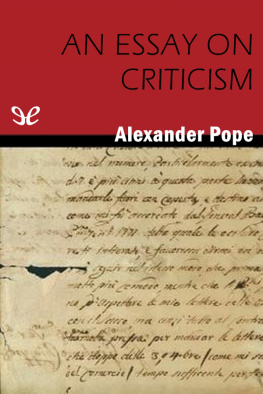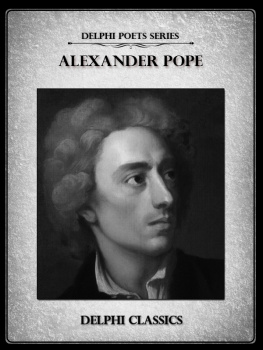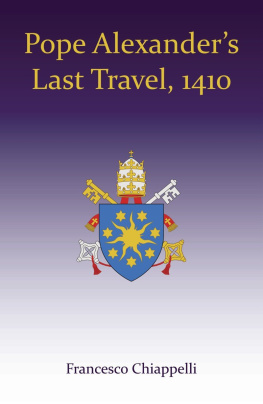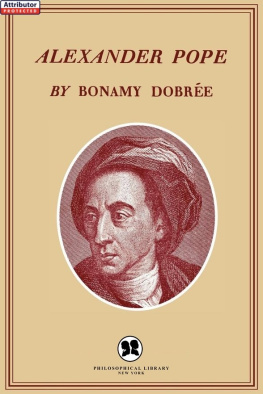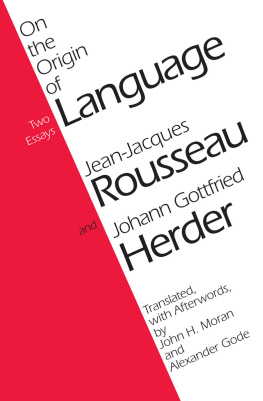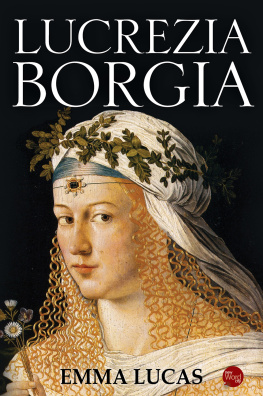Alexander Pope - An Essay On Criticism
Here you can read online Alexander Pope - An Essay On Criticism full text of the book (entire story) in english for free. Download pdf and epub, get meaning, cover and reviews about this ebook. genre: Science. Description of the work, (preface) as well as reviews are available. Best literature library LitArk.com created for fans of good reading and offers a wide selection of genres:
Romance novel
Science fiction
Adventure
Detective
Science
History
Home and family
Prose
Art
Politics
Computer
Non-fiction
Religion
Business
Children
Humor
Choose a favorite category and find really read worthwhile books. Enjoy immersion in the world of imagination, feel the emotions of the characters or learn something new for yourself, make an fascinating discovery.
- Book:An Essay On Criticism
- Author:
- Genre:
- Rating:3 / 5
- Favourites:Add to favourites
- Your mark:
- 60
- 1
- 2
- 3
- 4
- 5
An Essay On Criticism: summary, description and annotation
We offer to read an annotation, description, summary or preface (depends on what the author of the book "An Essay On Criticism" wrote himself). If you haven't found the necessary information about the book — write in the comments, we will try to find it.
An Essay On Criticism — read online for free the complete book (whole text) full work
Below is the text of the book, divided by pages. System saving the place of the last page read, allows you to conveniently read the book "An Essay On Criticism" online for free, without having to search again every time where you left off. Put a bookmark, and you can go to the page where you finished reading at any time.
Font size:
Interval:
Bookmark:

The title, An Essay on Criticism hardly indicates all that is included in the poem. It would have been impossible to give a full and exact idea of the art of poetical criticism without entering into the consideration of the art of poetry. Accordingly Pope has interwoven the precepts of both throughout the poem which might more properly have been styled an essay on the Art of Criticism and of Poetry.
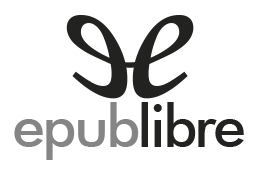
Alexander Pope
ePub r1.0
Titivillus 17.11.16
Ttulo original: An Essay On Criticism
Alexander Pope, 1711
Editor digital: Titivillus
ePub base r1.2
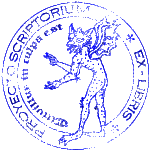

ALEXANDER POPE. This eminent English poet was born in London, May 21, 1688. His parents were Roman Catholics, and to this faith the poet adhered, thus debarring himself from public office and employment. His father, a linen merchant, having saved a moderate competency, withdrew from business, and settled on a small estate he had purchased in Windsor Forest. He died at Chiswick, in 1717. His son shortly afterwards took a long lease of a house and five acres of land at Twickenham, on the banks of the Thames, whither he retired with his widowed mother, to whom he was tenderly attached and where he resided till death, cultivating his little domain with exquisite taste and skill, and embellishing it with a grotto, temple, wilderness, and other adjuncts poetical and picturesque. In this famous villa Pope was visited by the most celebrated wits, statesmen and beauties of the day, himself being the most popular and successful poet of his age. His early years were spent at Binfield, within the range of the Royal Forest. He received some education at little Catholic schools, but was his own instructor after his twelfth year. He never was a profound or accurate scholar, but he read Latin poets with ease and delight, and acquired some Greek, French, and Italian. He was a poet almost from infancy, he lisped in numbers, and when a mere youth surpassed all his contemporaries in metrical harmony and correctness. His pastorals and some translations appeared in 1709, but were written three or four years earlier. These were followed by the Essay on Criticism, 1711; Rape of the Lock (when completed, the most graceful, airy, and imaginative of his works), 1712-1714; Windsor Forest, 1713; Temple of Fame, 1715. In a collection of his works printed in 1717 he included the Epistle of Eloisa and Elegy on an Unfortunate Lady, two poems inimitable for pathetic beauty and finished melodious versification.
From 1715 till 1726 Pope was chiefly engaged on his translations of the Iliad and Odyssey, which, though wanting in time Homeric simplicity, naturalness, and grandeur, are splendid poems. In 1728-29 he published his greatest satire the Dunciad, an attack on all poetasters and pretended wits, and on all other persons against whom the sensitive poet had conceived any enmity. In 1737 he gave to the world a volume of his Literary Correspondence, containing some pleasant gossip and observations, with choice passages of description but it appears that the correspondence was manufactured for publication not composed of actual letters addressed to the parties whose names are given, and the collection was introduced to the public by means of an elaborate stratagem on the part of the scheming poet. Between the years 1731 and 1739 he issued a series of poetical essays moral and philosophical, with satires and imitations of Horace, all admirable for sense, wit, spirit and brilliancy of these delightful productions, the most celebrated is the Essay on Man to which Bolingbroke is believed to have contributed the spurious philosophy and false sentiment, but its merit consists in detached passages, descriptions, and pictures. A fourth book to the Dunciad, containing many beautiful and striking lines and a general revision of his works, closed the poets literary cares and toils. He died on the 30th of May, 1744, and was buried in the church at Twickenham.
Pope was of very diminutive stature and deformed from his birth. His physical infirmity, susceptible temperament, and incessant study rendered his life one long disease. He was, as his friend Lord Chesterfield said, the most irritable of all the genus irritabile vatum, offended with trifles and never forgetting or forgiving them. His literary stratagems, disguises, assertions, denials, and (we must add) misrepresentations would fill volumes. Yet when no disturbing jealousy vanity, or rivalry intervened was generous and affectionate, and he had a manly, independent spirit. As a poet he was deficient in originality and creative power, and thus was inferior to his prototype, Dryden, but as a literary artist, and brilliant declaimer satirist and moralizer in verse he is still unrivaled. He is the English Horace, and will as surely descend with honors to the latest posterity.
[1]Wit is used in the poem in a great variety of meanings (1) Here it seems to mean genius or fancy, (2) in line 36 a man of fancy, (3) in line 53 the understanding or powers of the mind, (4) in line 81 it means judgment.]
[2] [Line 26: SchoolsDifferent systems of doctrine or philosophy as taught by particular teachers.]
[3] [Line 34: MaeviusAn insignificant poet of the Augustan age, ridiculed by Virgil in his third Eclogue and by Horace in his tenth Epode.]
[4] [Lines 80, 81: There is here a slight inaccuracy or inconsistency, since wit has a different meaning in the two lines: in 80, it means fancy, in 81, judgment.]
[5] [Line 86: The winged courser.Pegasus, a winged horse which sprang from the blood of Medusa when Perseus cut off her head. As soon as born he left the earth and flew up to heaven, or, according to Ovid, took up his abode on Mount Helicon, and was always associated with the Muses.]
[6] [Line 94: Parnassus.A mountain of Phocis, which received its name from Parnassus, the son of Neptune, and was sacred to the Muses, Apollo and Bacchus.]
[7] [Line 97: Equal steps.Steps equal to the undertaking.]
[8] [Line 129: The Mantuan MuseVirgil called Maro in the next line (his full name being, Virgilius Publius Maro) born near Mantua, 70 B. C.]
[9] [Lines 130-136: It is said that Virgil first intended to write a poem on the Alban and Roman affairs which he found beyond his powers, and then he imitated Homer:
Cum canerem reges et proelia Cynthius aurem
VellitVirg. Ecl. VI]
[10] [Line 138: The StagiriteAristotle, born at the Greek town of Stageira on the Strymonic Gulf (Gulf of Contessa, in Turkey) 384 B. C., whose treatises on Rhetoric and the Art of Poetry were the earliest development of a Philosophy of Criticism and still continue to be studied.
The poet contradicts himself with regard to the principle he is here laying down in lines 271-272 where he laughs at Dennis for
Concluding all were desperate sots and fools
Who durst depart from Aristotles rules.]
[11] [Line 180: Homer nods
Font size:
Interval:
Bookmark:
Similar books «An Essay On Criticism»
Look at similar books to An Essay On Criticism. We have selected literature similar in name and meaning in the hope of providing readers with more options to find new, interesting, not yet read works.
Discussion, reviews of the book An Essay On Criticism and just readers' own opinions. Leave your comments, write what you think about the work, its meaning or the main characters. Specify what exactly you liked and what you didn't like, and why you think so.

